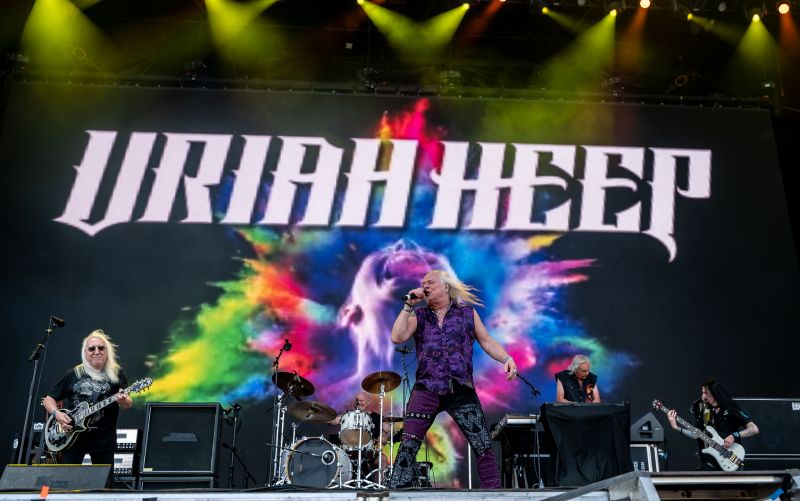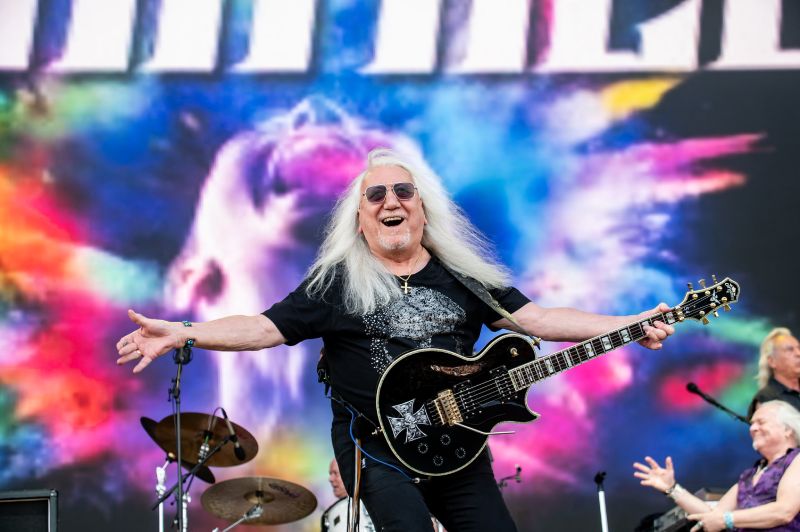
An Interview with Mick Box: The Last Standing Member of Uriah Heep’s Classic Lineup;The band never changed their musical template, but 1980s producers demanded they sound a certain way to get radio play. But

Mick Box, the legendary guitarist and founding member of Uriah Heep, has been the driving force behind one of rock’s most enduring bands for over five decades. As the sole remaining member of the group’s classic 1970s lineup, Box has witnessed the evolution of heavy metal from its earliest days and helped shape the genre with Uriah Heep’s distinctive blend of progressive rock, metal, and multi-layered harmonies. From their groundbreaking debut “Very ‘Eavy… Very ‘Umble” to their continued touring schedule that spans continents, Box remains as passionate about music as ever. In this candid interview, he discusses the band’s origins, their influence on heavy metal, and what keeps him going after all these years.
1. Tell us how you became involved with The Bullet Boys Metal Yacht Club, Mick?
Well, John Lappen from Cleopatra Records USA sent me an email asking if I would like to be involved in this project. Being a fan of the Doobie Brothers and ‘Takin’ It to The Streets,’ being one of my favourite songs of theirs, it was a no brainer, so I said yes.
2. How did Uriah Heep form?

We were a four-piece band called ‘Spice’ that was discovered by a manager called Gerry Bron back in 1969. He had the ability to put us in the recording studio after hearing us live in a blues club in a place called High Wycombe in England. We were playing original songs, so he was suitably impressed. After recording several tracks, I felt that we should add some keyboards to embellish our songs, and I was a big fan of ‘Vanilla Fudge’ and in particular Mark Stein the Hammond organ player. I felt this instrument was versatile and would fit nicely on all the tracks we had recorded as our first album was called ‘Very ‘Eavy, Very ‘Umble, and we had recorded a little bit of rock, metal, folk, jazz, and blues. We found a Hammond keyboard player called Ken Hensley who had been recommended by our bass player Paul Newton who had worked with him in a band called ‘The Gods.’ This worked very well so he joined us and with the musical template changing we felt we should change the name of the band too. This was in 1970, and it was the 100th anniversary of the death of Charles Dickens the great English novelist. To celebrate there were TV shows with advertising everywhere and one of his famous books called ‘David Copperfield,’ was made into a film. Our manager took his two sons to see this film and when he saw the Dickensian character called Uriah Heep who was not a very nice man incidentally, he came back and suggested we should use that name. To use a character from such a literary giant as Charles Dickens appealed to everyone, so the change of name happened.
3. What was it like recording “Very ‘Eavy, Very ‘Umble” back in 1969?
It was exciting and recorded on an 8-track recorder which was amazing. We found that with five singers in the band we could also use our vocals as another instrument. Previously in the late sixties harmonies were used very sweetly sung with the chorus and backing harmonies but we found a way to take this further, and it is best explained by listening to our song ‘Gypsy.’ We then went on to our second album ‘Salisbury,’ and we used step harmonies, and those two harmony ideas have influenced many other bands since so we are often told.
4. Any metal bands of today that you like?

Judas Priest – I recently saw King Diamond in London who I enjoyed and their vocalist King said he was inspired by Heep when he was getting into music, and particularly our singer David Byron. Metallica are always good and come across with the right energy.
5. What was the album that made music listeners take notice of Uriah Heep?
I guess ‘Demons and Wizards’ was the album to take us on to the world stage. One of our songs, ‘Easy Livin” seemed to explode worldwide. Also, we had cover artwork by the now famous Roger Dean, so it was the first time our music and artwork were intrinsically linked.
6. How do you feel Uriah Heep’s music has changed from the 70s into the 80’s?
We have never changed our musical template and always tried to apply that to well written songs with strong lyrical content but in the 80’s the producers had all the power, and you had to sound a certain way to even get on the radio. It was the days of Mutt Lange who produced albums like Def Leppard and taking over a year to do it.
7. What is your favorite Uriah Heep album and why?
Personally, I like our album ‘Salisbury.’ The title track was our first dip of the toe into progressive rock, and it incorporated a 26-piece Brass and Woodwind section conducted by John Fiddy. Also, it is very eclectic which I like, covering a number of genres of music.
We have been told that, with songs like ‘Gypsy’ from our first album, we helped influence that genre, but there are so many other bands that can lay claim to that.
9. Do you still speak with any members of Uriah Heep?
I am the last standing of the famous line up and I do speak with Paul Newton our original bass player (the first 4 albums), also drummer Keith Baker (Salisbury), Iain Clark (drummer on Look At Yourself) and from the 80’s vocalist Peter Goalby, Keyboardist John Sinclair and Bob Daisley, both of whom were a big part of our success with our album ‘Abominog,’ that went into the top 40 in the USA. It seems like we have gone full circle because Bob Daisley is playing bass with me on The Bullet Boys version of ‘Takin’ It To The Streets.’
10. Any future plans and projects for you, Mick?
Uriah Heep has a full date sheet and at the start of this year, our vocalist Bernie Shaw and I played a concert in the Czech Republic with a 40-piece orchestra (The Bohemian Symphony Orchestra Prague,) then the band played seven dates in the UK, before playing in Uruguay, Argentina, Chile, Brazil (5 concerts) and Poland. We are presently moving into the European Festival season playing Spain, Austria, Norway, Sweden, Finland, Czech Republic, Romania and then we will do a lengthy tour that continues until the end of the year. In 2026 we are still in Europe for January and then we perform on the Rock Legends Cruise out of Fort Lauderdale, Florida and then our touring will continue from there. I am hoping that we can come to the USA too which is being worked upon by our manager and agent. Somewhere along the way we will write and record a new album, so we are super busy. I am also writing an autobiography which is coming along nicely, which I am trying to fit in along the way.
Leave a Reply